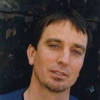Nick Flynn

Nick Flynn
Nick Flynnis an American writer, playwright, and poet. His most recent publication is The Reenactments, which chronicles Flynn's experience during the making of Being Flynn, a film based on his acclaimed 2004 memoir, Another Bullshit Night in Suck City. Flynn is also the author of three collections of poetry, including Some Ether, which won the inaugural PEN/Joyce Osterweil Award for Poetry in 1999, and was a finalist for the Los Angeles Times Book Prize...
NationalityAmerican
ProfessionPoet
Date of Birth26 January 1960
CountryUnited States of America
There's this sort of male energy that we have that can seem very destructive. But it doesn't have to be. It actually can be a very positive force.
In life you get one take, and it's perfect.
I'd always imagined that one day I would be a father, but mostly it was off my radar. I admired friends who had somehow figured out how to cross that threshold.
Writers, especially poets, are particularly prone to madness.
By the time I'm nine I know the world is a dangerous place. I've heard whispers about razorblades in apples, about Charlie Manson and his family. But no one is offering any clear information.
I get inspired by my friends, and if a friend is a writer, that is even deeper.
The first book I could call mine, my first book, was a picture book, The Magic Monkey - it was adapted from an old Chinese legend by a thirteen-year-old prodigy named Plato Chan with the help of his sister.
Some part of me knew he would show up, that if I stood in one place long enough he would find me, like you're taught to do when you're lost. But they never taught us what to do if both of you are lost, and you both end up in the same place, waiting.
Everything we do, I'd imagine, influences everything we will do.
To be honest, in my five years as an electrician, I never got the license.
Here's a secret: Everyone, if they live long enough, will lose their way at some point. You will lose your way; you will wake up one morning and find yourself lost. This is a hard, simple truth.
My father had always identified himself as a writer to my mother when they met. When they met, he was writing this great novel, there was no doubt about it. Part of why she left him was this delusion of greatness and identifying it very directly with being an artist.
Our job as writers, as far as I can tell, is to attempt to express what seems inexpressible.
What I do is write, and I try to write as closely as I can into what I call 'the mystery.'